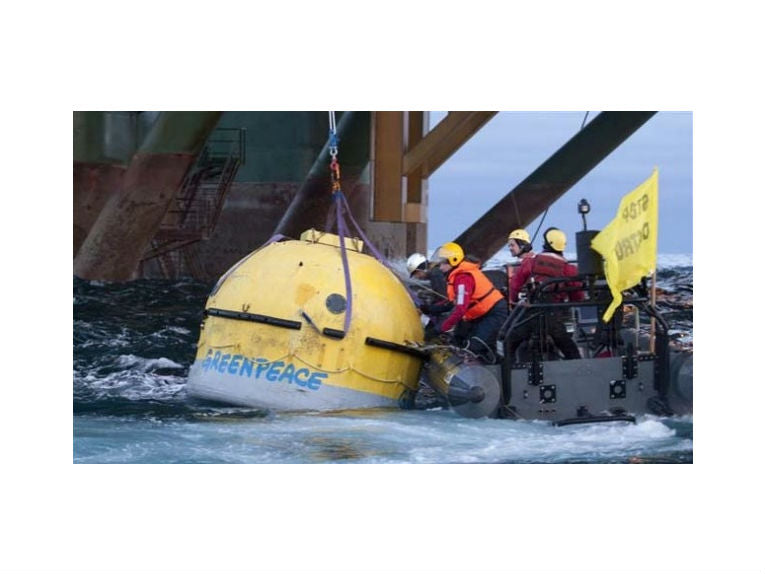The frozen waters of the Arctic are again home to confrontation, with Greenpeace successfully attaching a 'survival pod', with a pair of activists, to an oil drilling ship off of Greenland. They are determined to halt an oil exploration program which poses extra risks in the remote Arctic seas - and could help turn up the heat with climate change.
It's often said that oil and water don't mix - an adage proven so disastrously in the Deepwater Horizon oil spill, in the Gulf last year. Now Greenpeace, the global environmental organization, is doing its best to make sure that oil, and Arctic waters, never end up mixing, as it battles drilling companies eager to exploit the resources of the far North.
In its latest dramatic direct-action exploit, two activists from Greenpeace are holed up in a survival pod, one they attached to the drilling ship, Leiv Eiriksson, Sunday morning. They're hoping their presence - only feet from the drilling bit - will delay the planned oil exploration program, by UK-based Cairn Energy.
The license to explore off of the coast of Greenland was granted by its government several years ago. More licenses are expected to be announced shortly. This is the second year in which Greenpeace, Cairn Energy and the Danish navy have danced a merry jig around the icy Arctic seas. Greenpeace is concerned that a repeat of 2010's unprecedented drilling accident, in the Gulf of Mexico, could be even more devastating in its effects here, than those seen in BP's Deepwater Horizon spill.
That's because the area being explored is both more hazardous - prone to wild winter storms, icebergs and freezing temperatures - and more remote. Such isolation makes any recovery and clean-up from a spill potentially much more difficult. As reported in the Guardian, Greenpeace thinks the emergency response plan is inadequate - and that Greenland authorities and the oil company Cairn, have something to hide.
The organization notes that over 6,000 ships were involved in the Deepwater clear-up. ''It would be inconceivable that Cairn would be able mount anything like that response and they've studiously refused to publish any sort of emergency response plan,'' said Ben Ayliffe, Greenpeace campaigner. ''It's impossible to know what kind of response they would be able to deploy'
The Guardian reports Jorn Skov Nielsen, from Greenland's minerals and petroleum bureau, as dismissing claims of an ineffectual clean-up plan being deliberately hidden from the public. He blamed Greenpeace for keeping the government the details a secret: ''We don't want to publicize all these details to Greenpeace - the kind of information where they could find emergency equipment - because we think that there's a risk that they will try to destabilize the emergency plan. Because they have shown both this year and last year that they're willing to break the law,'' he said.
As the drilling rig standoff continues, and Greenland authorities consider legal moves against Greenpeace, this tussle could be seen as a critical battle in the wider issue of climate change. As the Arctic is warming faster than anywhere else on the planet - threatening to become ice-free within decades - oil companies are hungrily eying its newly accessible petroleum resources.
In a perverse irony, some of the very culprits driving the global thermometer upwards seem determined to exploit those same rising temperatures, to help line their pockets further. The outcome of this opening act of the Arctic drama, will play a big part in determining the plot of the ongoing climate change story.
Image Credit: © Greenpeace UK.










